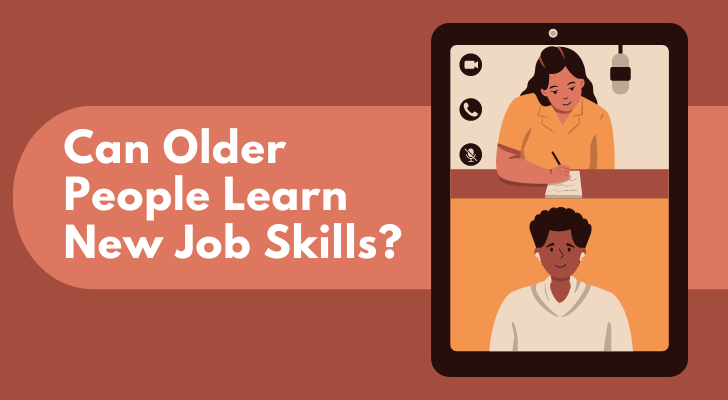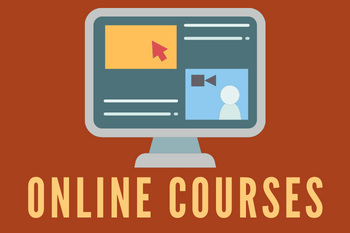As the job market continues to evolve, many employers are now looking for workers with new skills to keep up with the demand. But what about older people who may have a wealth of experience in their field but lack the skills needed to stay competitive?
Can they learn new job-related skills, or is it too late? Let's find out how older people can learn new job-related skills and succeed in today’s fast-paced workplace. I will look at the challenges they face, strategies they can use, and resources available to them. So if you’re an older person looking to gain some new skills and stay ahead of the competition, this post is for you.

Older Adults and the Workforce
Many people give up learning new job skills once they get to a certain age. Perhaps they have been laid off from their previous job and need to learn new skills to reenter the workforce. Or, maybe they are looking for a change in career and need to learn new skills to pursue their desired field. Whatever the reason, we CAN learn new job skills!
There are many ways to go about learning new job skills. One option is to take courses at a local community college or online. You can also look into attending workshops or seminars offered by businesses in your area. If you know someone who is already employed in the field you're interested in, ask if they would be willing to mentor you and teach you some of the necessary skills.
Older adults often have an advantage when it comes to learning new job skills because of their life experience. We know how to work hard and persevere through challenges. We also tend to be more patient and detail-oriented than younger adults. So don't let anyone tell you that you're too old to learn something new - age is just a number.
Is It Worth Learning New Job Skills At This Stage of Life?
It is a common misconception that older people are not able to learn new job skills. This is simply not true. There are many benefits to learning new job skills, regardless of age.
One of the biggest benefits is that it can help keep your mind sharp. As we age, it’s important to do things that keep our minds active and engaged. Learning new job skills can help with this.
It can also lead to a feeling of accomplishment and satisfaction. When you learn something new, it can give you a sense of pride and accomplishment. This can be especially beneficial if you’re retired or semi-retired and are looking for ways to stay engaged and active.
Learning new job skills can help you stay competitive in the workforce. If you’re looking for a new job or want to advance in your career, having up-to-date skills will make you more attractive to potential employers.
Finally, learning new job skills can simply be fun! It’s a great way to challenge yourself and keep your brain active. Whether you take a class, read books on the subject, or watch instructional videos, there are many ways to learn new things. And, who knows, you might just find that you have a hidden talent for something completely different than what you’ve been doing all these years!
How Older Adults Can Learn New Job Skills
You may feel like they're at a disadvantage when it comes to learning new job skills, but that doesn't have to be the case. There are plenty of ways for middle-aged people to brush up on their skills or learn new ones.
Online Courses

You can find online courses on just about any topic, including job-specific skills. Many online courses are self-paced, so learners can take their time and complete the course at their own pace.
Workshops/Seminars
Workshops or seminars events are often geared towards working professionals, so they can be a great way for older adults to learn new skills or brush up on existing ones. Attendees usually have the opportunity to network with other professionals as well, which can be beneficial for finding a new job or making connections in the industry.
Volunteering
You can also volunteer your time to gain new job skills. Volunteering is a great way to give back to the community while also gaining valuable experience. It's also a good way to meet new people and make connections that could lead to a new job down the road. And, if an older adult is having trouble finding paid work, volunteering can help fill the gap in their resume and give them something positive to focus on.
The Importance of Age-Diversity in the Workplace
Age diversity in the workplace is important for a number of reasons.
Diversity = Flexibility

First of all, it can help to create a more well-rounded and innovative workforce. Different age groups tend to have different strengths and weaknesses, and by bringing them together, organizations can take advantage of a wider range of skills and perspectives.
No (or Less) Discrimination
Age diversity can help to prevent age discrimination in the workplace. By having a mix of ages represented among employees, employers are less likely to make assumptions or judgments about people based on their age. This can create a more inclusive and fair workplace for everyone.
Overall Success
Age diversity can contribute to the overall success of an organization. Studies have shown that companies with diverse workforces tend to outperform those that are not as diverse. This is likely due to the fact that diverse teams are better able to solve problems and come up with new ideas.
So, why is age diversity important in the workplace? There are many good reasons! Organizations that value age diversity are more likely to be successful, innovative, and inclusive.
Changing a Job After 50?
There are plenty of good reasons to consider finding a new job after 50 that provides much-needed financial security in your later years.
For one thing, it can be very beneficial to your career to make a change at this point in your life. A new job can help you to learn new things, meet new people, and gain fresh perspectives on your chosen field.
It can also lead to increased responsibility and greater opportunities for advancement. And needless to say, it can simply be exciting and satisfying to start something new after years of experience in the same old job. Whatever your reasons for considering a new job, there are many benefits to be gained from making the switch later in life.
A Career Change In The Later Years Is Good
The later years of one’s career are often some of the most rewarding. Here are a few reasons why:
1. You’re more experienced
As you get older, you generally become more experienced in life. Even if you're not experienced in a particular job, you'll likely do better than younger people. This is because you've had more time to learn about different aspects of life and how to handle them. You know what works for you and what doesn't, so you're less likely to make mistakes. Plus, older people are usually more patient and level-headed, which can come in handy in difficult situations.
2. You know your worth
You have a better understanding of your worth and what you're capable of. You're more likely to choose a job based on fair pay instead of just accepting whatever is offered. This can be attributed to experience and confidence. With age comes the wisdom to know your own value and not settle for less.
3. You can be more selective
With more experience under your belt, you can afford to be choosier about the projects you take on and the companies you work for. You know what you're good at and what kind of environment brings out the best in you.
So, if a job doesn't fit those criteria, it's probably not worth your time. That's not to say that every job you take will be perfect, but as you get older, you'll have a better sense of what works for you and what doesn't.
4. You have a network

As you get older, you have a wider range of job selections available to you. This is because you have a bigger network of people. You may know more people who are in different industries and who can offer you advice or help you find a job that suits your skill set.
You also have more work experience under your belt, so employers are more likely to trust you with important tasks. Therefore, it's important to take advantage of your growing network and explore all the options that are open to you.
5. You can give back
You tend to become wiser and more in tune with what truly matters in life. You know how to better appreciate the simple things and see the value in every moment. This allows you to approach our work with a renewed sense of purpose and meaning.
You can use your skills and experience to make a difference in the world, whether it's through your jobs or other volunteer efforts. In this way, you can give back to the community and make a positive impact on those around you.
Read More: Top 10 Business Opportunities For Older Adults
The Disadvantages of Working After 50
There are a few disadvantages of working after 50 that include:
1. Your retirement savings may not be as high as you’d like:
If you’ve already retired once, your Social Security benefits may be lower than they could be, and you may have to dip into your savings more than you’d hoped.
2. You may have trouble finding a job:
The competition for jobs gets stiffer as you age, and employers may be reluctant to hire someone who is over 50.
3. Your health may start to decline:
This is especially true if you’ve been working in a physically demanding job. As you age, your body isn’t able to recover from injuries and illnesses as quickly as it used to.
4. You may have caregiver responsibilities:
If you have elderly parents or young grandchildren, you may need to take on the role of caregiver. This can be demanding both emotionally and physically and can make it difficult to maintain full-time employment outside the home.
How To Find a Job After 50
One of the best ways to find a job after 50 is to search online job boards. Many job boards, such as Indeed and CareerBuilder, have sections specifically for older workers. You can also search for “age-friendly” or “mature worker” jobs on these sites.
Another great way to find a job after 50 is to network with people you know. Many times, job openings are not publicly advertised, so it’s important to let your friends and family know that you’re looking for work. You may also want to consider joining a professional organization related to your field of interest. These organizations often have job listing services and can be a great way to meet other professionals in your field.
Finally, don’t forget about your local library! Libraries are often a wealth of resources for older workers, with staff members who are happy to help you find information on employment opportunities in your area.
How To Know If You're Ready To Retire
Retirement is a major life event, and it's important to make sure you're as prepared as possible before making the decision to retire. Here are a few things to consider when trying to determine if you're ready to retire:
1. Do you have enough saved up?
It's important to have enough saved up so that you can comfortably live off of your savings in retirement. Make sure to calculate how much money you'll need annually and plan accordingly.
2. Do you have a good health insurance plan?
Healthcare costs can be expensive, especially in retirement. Make sure you have a good health insurance plan that will cover your needs in retirement.
3. Have you considered your living arrangements?
Where will you live in retirement? Will you downsize or move to a new location? Make sure you've given some thought to your living arrangements so that you can be comfortable in retirement.
4. What will you do with your time?
Retirement can be a great time to pursue hobbies or travel. Make sure you have some ideas of how you'll spend your time in retirement so that you don't get bored.
5. Are you mentally and emotionally prepared for retirement?
Retirement can be a big adjustment emotionally and mentally. It's important to make sure you're prepared for the change before making the decision to retire.
Start Your Own Business
It's never too late to start your own online business. Many older people are doing it, and you can too. You don't need to quit your day job to do it - you can start learning affiliate marketing in your spare time.
There are many benefits to running your own online business. You can be your own boss, set your own hours, and work from anywhere in the world.
Affiliate marketing is definitely a good way to make some extra income, and it doesn't have to take over your life. You can start small and gradually grow your business as you have more time and energy to invest in it. CyberCash Worldwide has many resources available to help you get started, so don't be afraid to dive in and learn more about this exciting opportunity!
Did You Know You Already Have A LOT To Sell?
So What's Your Problem?

Conclusion
In conclusion, older people can learn new job skills with some dedication and patience. Many employers are recognizing the value of an experienced workforce and are actively seeking out older employees to add diversity to their organization. With the right attitude, a willingness to stay current on technology, and taking advantage of any training opportunities available, older job seekers can bring a great deal of knowledge, experience and enthusiasm to the workplace.

